

 |
||
 |
||
Vol. 7 (1): June 2004 |
Download this page
|
|
Greece / Israel / Madeira / Mauritania & Western Sahara / Turkey
Turkey
|
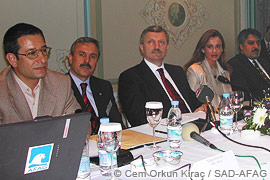 |
|
|
Left to right: Yalçin Savas, SAD-AFAG; Nuri Uslu, Deputy Undersecretary; Osman Pepe, Minister of Environment & Forests; Zeynep Karahan Uslu, Parliament member and Mustafa Kemal Yalinkiliç, General Director for Nature Protection & National Parks. |
In the press conference, Mr. Osman Pepe, Environment & Forests Minister made a keynote speech in which he emphasized the importance of protection of the endangered monk seal along Turkish coasts and pledged that 5 Important Monk Seal Sites (enjoying priority among 12 sites originally proposed) will have improved protection status through “Species Protection/Management Areas” according to IUCN criteria. The Minister also stated that such a status shall be included in the draft “Nature Protection Act” which is under preparation by his ministry. In accordance with the joint declaration by SAD-AFAG and the Ministry of Environment & Forests, the Minister stated that first the Foça Monk Seal Site shall be enlarged, while the status “Species Protection/Management Area” shall first be applied to Cilician coasts. Yalçin Savas, attending the press conference on behalf of SAD-AFAG, then made a short technical presentation about the 5 Important Monk Seal Sites. This was followed by AFAG’s new short documentary film on monk seals on Turkish coasts.
The press conference was attended by a large audience, including TV camera crews and newspaper journalists, environmentalists and the public. Mrs. Zeynep Karahan Uslu also made an appealing statement to the media on her affinity to monk seals and her satisfaction in being a “parent” of a monk seal.
 |
|
|
Map |
The Important Monk Seal Sites of Turkey were identified and reported to the National Monk Seal Committee of Turkey by SAD-AFAG in 1998 [see Endgame: the fight for marine protected areas in Turkey, TMG 5 (1): May 2002]. The 5 monk seal sites having priority are Gökçeada, Foça & Karaburun, Alaçati & Sigacik, Bodrum Peninsula and Cilician coasts, identified by SAD-AFAG through research activities dating back to 1987.
Following this commitment by the Minister, we expect that at least these 5 designated sites will enjoy a stronger and more stable protection status under the proposed “Nature Protection Act”, that will be drafted with harmonization to relevant EU Acquis measures on nature protection in mind. – Cem Orkun Kiraç, SAD-AFAG.
On 22 April 2004, we received a phone call alerting us that an ailing seal was drifting on the sea at Aliaga in Çandarli Bay (in the Izmir region of the Aegean).
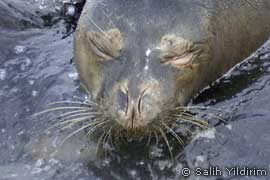 |
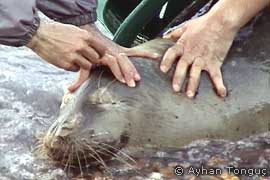 |
|
|
A veterinary examination indicated that the seal may have passed through a toxic chemical. |
Diverse medications, including cortisone and antibiotics, were administered by the SAD-AFAG team. |
When SAD-AFAG Foça researchers reached the site, the animal was found exhausted, unable to dive, floating on the surface and nearly stranded on the beach. Earlier, staff from a nearby petrol station as well as one of our volunteers, Mr Salih Yildirim of SUKOT, attended the animal, checking its condition and taking photos. The seal, however, had not responded to their intervention. Following our arrival, we warned all bystanders to leave. After examining the seal – a young adult female (approx. 2m in length) – from a distance and taking necessary identification pictures, we decided to bring the animal ashore in an effort to lessen heat loss. We feared that the seal – outwardly in good physical condition – might be suffering from an acute, and possibly fatal, illness.
During our first period of observation, we consulted MOm and SRRC experts about the situation. The animal returned to sea after 2.5 hours of resting. Two and a half hours later we found her in another bay, again almost stranded and exhausted. Together with the help of Mr. Avni Gök, a veterinarian for the Municipality of Foça, the seal was again examined. The skin of the animal was found to be covered with a layer of oil and partially covered with small patches of tar. Moreover, toxic burning was deteremined in and around her mouth, around her eyes (possibly an explanation of why the animal kept closing her eyes). After the examination, we concluded that the animal must have passed through a floating toxic chemical agent of some kind.
We were not able to take blood samples nor record the body temperature since the animal was difficult to restrain. The following medication was applied to the animal: locally a cortisone-based eye ointment (Hydrocortisone acetate and cholorampenicol); against secondary infections an antibiotic (active agent: amoksisilin 2,5g) was injected intramuscularly. Against parasites, avermectin (5cc) was injected intramuscularly. Prednisolon (4 ampules) was also injected intramuscularly to boost the animal’s general condition.
The animal was then released. Though we searched for the seal during the following week, we could find no trace of her. In order to improve our sighting chances, a press release was distributed. Feedback was received on 30th of April to the effect that a monk seal had been sighted in the same area. However, the information is not detailed enough to determine whether the animal was the same individual. Unfortunately, despite our sighting efforts, we remain uncertain as to the fate of this seal. – Harun Güçlüsoy, SAD-AFAG.
Readers who have followed progress of this project in previous issues of TMG may also remember that effective management plans for protected areas, stakeholder participation in the conservation process and no-fishing zones to benefit seals, fishermen and the marine ecosystem at large, were among the principal objectives of SAD-AFAG's collaborative project with WWF MedPO [see Coastal Zone Management Project Commences, TMG 5 (1): May 2002, Progress reported in coastal zones project, TMG 5 (2) November and Further progress for coastal zones project, TMG 6 (1): June 2003].
Due to close by December 2004, here are some of the project’s principal accomplishments, and activities that require follow-up:
Management Plans: Detailed coastal zone management (CZM) plans, prepared for Foça-Yeni Foça-Karaburun in the Aegean and Aydincik in the Cilician Basin, were submitted to the Ministry of Environment and Forests in December 2002 (2 of 5 “Important Monk Seal Sites” selected by the National Monk Seal Committee). Just recently, on 7 May 2004, (see Turkish Government pledges 5 new protected areas for the Monk Seal, this issue) Mr. Osman Pepe, The Minister of Environment and Forests, expressed the ministry’s intention to establish these sites as well as three other important monk seal sites to be protected in the near future.
No Fishing Zones: Out of 6 No Fishing Zones (1 on Karaburun Peninsula and 5 in the Cilician Basin) proposed by the Technical Seal Committee of the National Monk Seal Committe, 3 were subsequently established: one in Ayibaligi, Karaburun Peninsula, and two in Kizilliman and Melleç in the Cilician. Though the 4th one had twice been proposed by SAD-AFAG and the Aydincik Fishing Cooperative, the proposal failed to be taken up as an agenda item in meetings of the Advisory Group of the Ministry of Agriculture and Rural Affairs. We have, however, been assured that the proposal will be discussed at the main meeting of the committee which will be held in June/July 2004.
New Patrolling Sytem in Aydincik: A new patrol boat was launched in June 2003, according to a system in force in Foça. A proposal that the Gendarmerie assume responsibility for guarding was eventually rejected due to administrative reasons. SAD-AFAG therefore requested that the Aydincik Governorship overtake the guarding of the area, a proposal that was subsequently accepted. A protocol will be signed between the Governorship and SAD-AFAG in June 2004 to activate this system.
Project results published:
Güçlüsoy, H. Savas, Y., Veryeri, N.O., Bolat, A., Kiraç, C.O., Veryeri, N., Çigdem, A., Çaglayan, Y., Aslan, Y., Öner, Ç., Yolak, U. 2004. Akdeniz’de Biyoçesitlilik Hassas Noktalarin Korunmasi : Türkiye Proje Sonuçlari. E. Özhan ve H. Evliya Eds. Türkiye’nin Kiyi ve Deniz Alanlari V. Ulusal Konferansi, Türkiye Kiyilari 04 Konferansi Bildiriler Kitabi, 4-7 Mayis 2004, Adana, 63-71.
A project funded by the European Commission is encouraging the flow of expertise and experience between Greek and Turkish monk seal conservationists.
The project (“Capacity Building Over the Aegean – Twinning of Environmental NGOs SAD-AFAG, Turkey and MOm, Greece”) runs from 1 January – 30 June 2004.
The project’s overall objective of is to increase the institutional capacity of SAD-AFAG in Turkey – a prospective Candidate Country for EU membership – through cooperative ties with its Greek counterpart, MOm. Meetings between the two sides will help SAD-AFAG gain access to MOm’s experience in various fields, including
TUSSOCK Tourism, which organises ‘Blue Voyages’ under sail along the Turkish coast, has made a donation towards SAD-AFAG conservation activities. During the previous tourist season, TUSSOCK launched a fund raising and awareness campaign among its customers and subsequently donated 2,300 Euros to SAD-AFAG to be used in aid of the monk seal. At a press conference held on 25 February 2004 in Bodrum to inform the public about the contribution, the manager of TUSSOCK stated that the company will continue collecting donations for SAD-AFAG activities. All tourism activities in the region are, in fact, using the habitats of monk seals, marine turtles and Audouin’s gulls as capital. Conserving these species and their habitats is the most important provision for tourism sustainability. Ensuring that their operations do not inflict harm upon nature, while providing financial donations towards conservation activities, would represent a significant step for the future of the tourism sector. – Yesim Aslan & Yalçin Savas, SAD-AFAG.
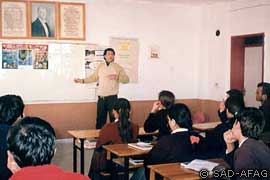 |
|
|
Bozyazi educational seminar. |
Responding to an invitation from the geography teacher of Bozyazi High School, SAD-AFAG’s local project assistant organised a seminar for students on the Mediterranean ecosystem, the monk seals and the importance of Marine Conservation Areas.
Bozyazi in the Cilician Basin, on Turkey’s southern Mediterranean coast, also acts as a regional office for SAD-AFAG. 394 students took part in the seminar in 36 lessons. In total during 2003, 1434 Bozyazi students learnt about monk seals and their habitats. – Yesim Aslan & Ahmet Bolat, SAD-AFAG.
SAD-AFAG is running a publication project entitled “Integrating Locals in the Conservation of Foça and Karaburun’s Marine Ecosystem” with the support of GEF-SGP Turkey. Within the project SAD-AFAG has prepared 5 brochures, 2 posters, 1 story book for kids and a sticker. The brochures focus on the monk seal, fisheries and No-Fishing-Zones in Turkey, and the work of SAD-AFAG. The posters feature the Marine Protected Areas in Foça and Karaburun. The children’s book is a story book about monk seals and the marine ecosystem, with both games and educational information. And the sticker, a tool in SAD-AFAG’s developing rescue network, provides contact information in case any member of the public encounters dead, sick or orphaned monk seals. These materials will be distributed free of charge to local fishermen, children and local people of Foça and Karaburun. – Yesim Caglayan.
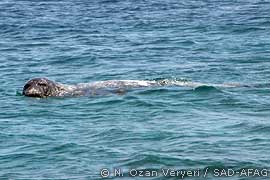 |
|
|
|
N. Ozan Veryeri, senior field researcher at SAD-AFAG’s Karaburun Project Office, identified a new monk seal individual along the coasts of Büyükada Island near Karaburun on 30 May 2004 during a routine field survey. Over a long period of time, Ozan photographed and filmed the new adult male monk seal that has a patchy pale pelage and distinctive markings.
The new individual has been added to the “identified seals” catalogue of AFAG and will soon be named through voting among AFAG members and “parents” adopting monk seals along Turkish coasts. Considering the scarcity of male individuals in the area, this adult male might play an important role in the demographic structure of the local monk seal population. – Cem Orkun Kiraç, SAD-AFAG.
Signs and buoys listing access restrictions to the Siren Rocks core zone of the Foça Specially Protected Area have recently been installed. These replace earlier large signboards on the Rocks that were quickly toppled in the exposed weather conditions.
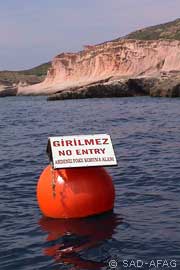 |
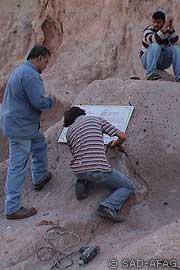 |
|
|
Restriction buoy at the Siren Rocks. |
Marble plate restrictions signs are affixed to the Siren Rocks. |
This time, the regulations have been carved on marble plates and affixed to the rocks. The southern sign reads:
“You are at the southern cape of the Siren Rocks of Orak Island, Foça Monk Seal Protection Area. Navigating, swimming, diving, walking and sunbathing are among the activities that are prohibited at the Siren Rocks. It is forbidden to pass beyond this point.
Additionally, camping, lighting campfires and staying overnight is prohibited throughout the Foça Islands, with the exception of Incir Island. Hunting is not permitted on any of the Islands. We thank you for your kind support for the conservation of the critically endangered Mediterranean monk seal by not passing beyond this point, and by strictly observing the regulations.”
– Yalcin Savas, SAD/AFAG.
Copyright © 2004 The Monachus Guardian. All Rights Reserved |